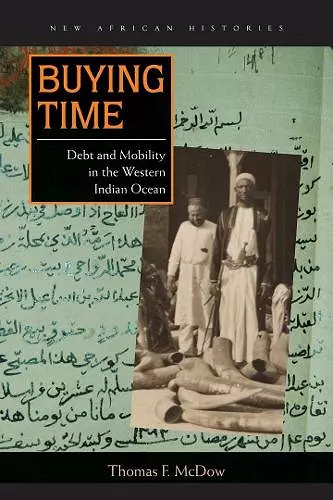Buying Time
Debt and Mobility in the Western Indian Ocean
Format:Hardback
Publisher:Ohio University Press
Published:25th May '18
Currently unavailable, and unfortunately no date known when it will be back
This hardback is available in another edition too:
- Paperback£28.99was £28.99(9780821422823)

In Buying Time, Thomas F. McDow synthesizes Indian Ocean, Middle Eastern, and East African studies as well as economic and social history to explain how, in the nineteenth century, credit, mobility, and kinship knit together a vast interconnected Indian Ocean region. That vibrant and enormously influential swath extended from the desert fringes of Arabia to Zanzibar and the Swahili coast and on to the Congo River watershed.
In the half century before European colonization, Africans and Arabs from coasts and hinterlands used newfound sources of credit to seek out opportunities, establish new outposts in distant places, and maintain families in a rapidly changing economy. They used temporizing strategies to escape drought in Oman, join ivory caravans in the African interior, and build new settlements.
The key to McDow's analysis is a previously unstudied trove of Arabic business deeds that show complex variations on the financial transactions that underwrote the trade economy across the region. The documents list names, genealogies, statuses, and clan names of a wide variety of people—Africans, Indians, and Arabs; men and women; free and slave—who bought, sold, and mortgaged property. Through unprecedented use of these sources, McDow moves the historical analysis of the Indian Ocean beyond connected port cities to reveal the roles of previously invisible people.
"Deeply researched and impressive in scope. It highlights the importance of multi-site research—McDow conducted extensive archival research on three continents and makes particularly strong use of sources from Zanzibar, India, and the United Kingdom. The book is clearly written and compelling. It is suitable to be assigned in whole or in part to undergraduate and graduate courses on the history of the Indian Ocean and East Africa and should be in the library of every scholar of the nineteenth-century Indian Ocean." (International Journal of African Historical Studies, Vol. 53 No. 2 (2020)) "In Buying Time, McDow argues for a transnational western Indian Ocean network of credit and debt that linked both coastal and interior Oman to Zanzibar and the continental African interior in the long nineteenth century. With remarkable, previously ignored Arabic legal documents at its heart, McDow's analysis is notably innovative in the way it links environmental factors, debt, and mobility." "If scholars have long known in a general way that Oman and East Africa were connected, McDow traces out many of the specific and unexpected ways in which they were, in the stories and actions of specific persons. This is new territory." "This is a brilliant, readable study…[McDow] demonstrates effectively that seas connect traders and peoples rather than divide them.…Summing up: Highly recommended." (CHOICE) McDow's stimulating elaboration of the Omanis' alternative understanding of space as composed of reliable obligations to and from others, at whatever geographical distance, reveals a western Indian Ocean world in motion, greatly enabled by its regular seasonally alternating monsoon winds…. McDow delivers provocatively on his initial promise of depicting 'a historical process rooted in Islamic finance and adapted to a burgeoning global commodity trade'. (Journal of World History) "McDow has given us a compelling and beautifully crafted account of the people who moved across the nineteenth-century western Indian Ocean and the factors that both enabled and constricted their mobility. He has captured the cadence of their lives and reveals to what extent time and financial transactions shaped their agency across the ocean, as abolitionists and imperialists competed with and against them." (Transnational, Cross-Regional, and Global Connections)
ISBN: 9780821422816
Dimensions: unknown
Weight: unknown
378 pages